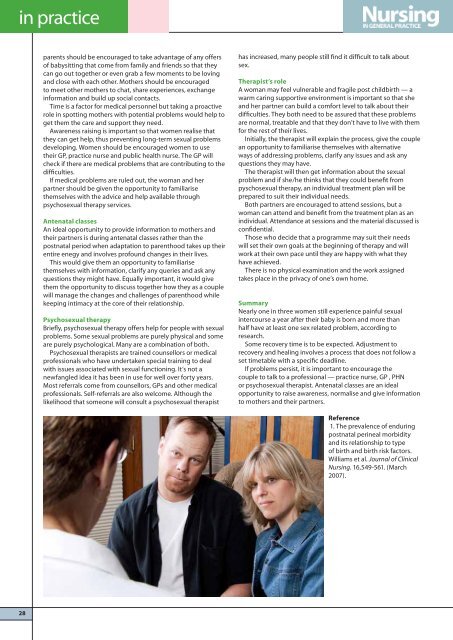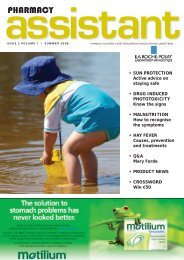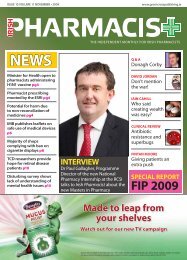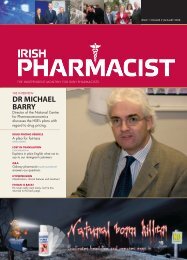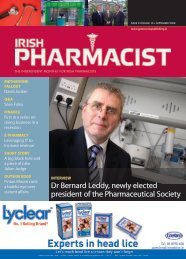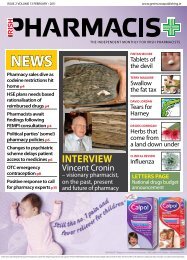veNTIlATIoN - Green Cross Publishing
veNTIlATIoN - Green Cross Publishing
veNTIlATIoN - Green Cross Publishing
Create successful ePaper yourself
Turn your PDF publications into a flip-book with our unique Google optimized e-Paper software.
in practice<br />
28<br />
parents should be encouraged to take advantage of any offers<br />
of babysitting that come from family and friends so that they<br />
can go out together or even grab a few moments to be loving<br />
and close with each other. Mothers should be encouraged<br />
to meet other mothers to chat, share experiences, exchange<br />
information and build up social contacts.<br />
Time is a factor for medical personnel but taking a proactive<br />
role in spotting mothers with potential problems would help to<br />
get them the care and support they need.<br />
Awareness raising is important so that women realise that<br />
they can get help, thus preventing long-term sexual problems<br />
developing. Women should be encouraged women to use<br />
their GP, practice nurse and public health nurse. The GP will<br />
check if there are medical problems that are contributing to the<br />
difficulties.<br />
If medical problems are ruled out, the woman and her<br />
partner should be given the opportunity to familiarise<br />
themselves with the advice and help available through<br />
psychosexual therapy services.<br />
Antenatal classes<br />
An ideal opportunity to provide information to mothers and<br />
their partners is during antenatal classes rather than the<br />
postnatal period when adaptation to parenthood takes up their<br />
entire enegy and involves profound changes in their lives.<br />
This would give them an opportunity to familiarise<br />
themselves with information, clarify any queries and ask any<br />
questions they might have. Equally important, it would give<br />
them the opportunity to discuss together how they as a couple<br />
will manage the changes and challenges of parenthood while<br />
keeping intimacy at the core of their relationship.<br />
Psychosexual therapy<br />
Briefly, psychosexual therapy offers help for people with sexual<br />
problems. Some sexual problems are purely physical and some<br />
are purely psychological. Many are a combination of both.<br />
Psychosexual therapists are trained counsellors or medical<br />
professionals who have undertaken special training to deal<br />
with issues associated with sexual functioning. It’s not a<br />
newfangled idea it has been in use for well over forty years.<br />
Most referrals come from counsellors, GPs and other medical<br />
professionals. Self-referrals are also welcome. Although the<br />
likelihood that someone will consult a psychosexual therapist<br />
has increased, many people still find it difficult to talk about<br />
sex.<br />
Therapist’s role<br />
A woman may feel vulnerable and fragile post childbirth — a<br />
warm caring supportive environment is important so that she<br />
and her partner can build a comfort level to talk about their<br />
difficulties. They both need to be assured that these problems<br />
are normal, treatable and that they don’t have to live with them<br />
for the rest of their lives.<br />
Initially, the therapist will explain the process, give the couple<br />
an opportunity to familiarise themselves with alternative<br />
ways of addressing problems, clarify any issues and ask any<br />
questions they may have.<br />
The therapist will then get information about the sexual<br />
problem and if she/he thinks that they could benefit from<br />
pyschosexual therapy, an individual treatment plan will be<br />
prepared to suit their individual needs.<br />
Both partners are encouraged to attend sessions, but a<br />
woman can attend and benefit from the treatment plan as an<br />
individual. Attendance at sessions and the material discussed is<br />
confidential.<br />
Those who decide that a programme may suit their needs<br />
will set their own goals at the beginning of therapy and will<br />
work at their own pace until they are happy with what they<br />
have achieved.<br />
There is no physical examination and the work assigned<br />
takes place in the privacy of one’s own home.<br />
summary<br />
Nearly one in three women still experience painful sexual<br />
intercourse a year after their baby is born and more than<br />
half have at least one sex related problem, according to<br />
research.<br />
Some recovery time is to be expected. Adjustment to<br />
recovery and healing involves a process that does not follow a<br />
set timetable with a specific deadline.<br />
If problems persist, it is important to encourage the<br />
couple to talk to a professional — practice nurse, GP , PHN<br />
or psychosexual therapist. Antenatal classes are an ideal<br />
opportunity to raise awareness, normalise and give information<br />
to mothers and their partners.<br />
reference<br />
1. The prevalence of enduring<br />
postnatal perineal morbidity<br />
and its relationship to type<br />
of birth and birth risk factors.<br />
Williams et al. Journal of Clinical<br />
Nursing. 16,549-561. (March<br />
2007).


